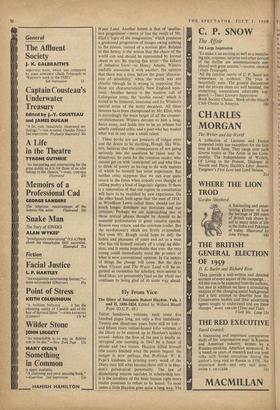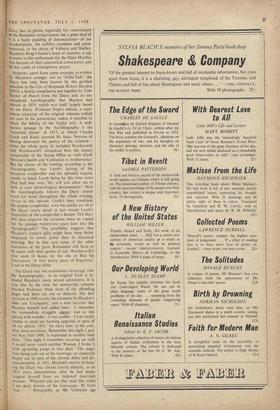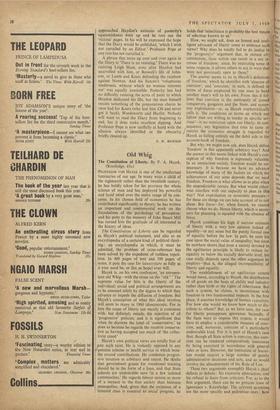Fly From Vice
The Diary of Benjamin Robert Haydon. Vols. 1 and II, 1808-1824. Edited by Willard Bissell Pope. (O.U.P., L8.) THESE handsome volumes, each some five hundred pages long, are only a first instalment. Twenty-one disastrous years have still to roll— and fifteen more vellum-bound folio volumes of the Diary to be entered up in Haydon's spidery scrawl—before the flow of the pen is finally in- terrupted one morning in 1845 by a brace of pistols and two razors. Haydon killed himself (the razors finished what the pistols began), the danger is now perhaps that Professor W. B. Pope's kindness in printing every word of the Diary may kill what interest there still is in Hay- don's paradoxical personality. The law of diminishing returns operates in scholarship too: it is the corollary of the basic human right every reader possesses to refuse to be bored. To most tastes a little Haydon goes quite a long way. The Diary has its plums, especially for connoisseurs of the Romantic temperament, but a great deal of it is a hasty pudding of denunciations—of the Academicians, the nobility (tasteless and parsi- monious), or the deism of Voltaire and Shelley. Haydon's King Charles's head of anatomy is apt to come in (his enthusiasm for the Elgin Marbles. Was because of their anatomical correctness), and he has yards of extemporary. .prayer.
Hitherto, apart from some excerpts re-written by Haydon's younger son as 'Table-Talk,' the Diary 'has only been known by the garbled selection in the Life of Benjamin Robert Haydon (1853), a family compilation put together by Tom Taylor of Punch from the Diary and an un- completed Autobiography that Haydon had started in 1839, which was itself largely based on the Diary. Professor Pope's edition. a meti- culous transcript of the original volumes (which are now in his possession), makes it possible to check the fidelity of the Taylor text. A well- known passage in the Autobiography is the 'immortal dinner' of 1817, at which Charles Lamb and Keats accused Sir Isaac Newton of having destroyed the poetry of the rainbow— when the whole party (it included Wordsworth and Wordsworth's immediate boss the deputy comptroller of the Stamp Office as well) drank Newton's health and 'Confusion to mathematics.' But the climax of the evening, according to the Autobiography, was Lamb's baiting of the pompous comptroller and the splendid request, candle in hand, Lamb being by this time more than half seas over, 'Sir, will you allow me to look at your phrenological development?' Now the Autobiography follows the Diary almost word for word throughout the whole evening, except in this episode. Lamb's tipsy condition, the asinine comptroller, even the candle arc all in the Diary—every detail in fact except Lamb's inspection of the comptroller's bumps. Did Hay- don then improve the occasion when he copied Out the passage twenty-two years later into the Autobiography? The possibility suggests that Haydon's creative gifts might have been better employed in comic prose than in historical Painting. But in that case some of the other anecdotes of the great Romantics will have to be taken with their grains of salt. Wordsworth's nice snub to Keats on the ode to Pan (in Endynrion), 'A very pretty piece of Paganism,' ii not in the Diary either.
The Diary has one scandalous advantage over the Autobiography : in its original form it in- cluded Haydon's many sexual adventures. It is true that by the time the manuscript volumes reached Professor Pope most of the offending Pages had been cut out or defaced. The first excision in 1808 carries the comment by Haydon's elder son 'Unchastity,' and a note survives that Haydon himself had added later : 'I remember my tremendous struggles agAinst vice at thii Period with wonder--it was useless-1 was totally unable to remit my burning appetites in spite of all my efforts. 1816.' An entry later in the year, after more excisions, 'Remember this night past ten Nov 16th 1808,' is explained in another later note: 'This night I remember swearing an oath would never touch another Woman. I broke it With agonising pangs in two days.' The pages stop being torn out at his marriage, an unusually happy one in spite of the chronic debts and dis- appointments, in 1821. Haydon's motive in keep- ing the Diary was always strictly didactic, as an 1812 entry demonstrates after he had disen- tangled himself from an 'infernal' (married) woman : 'Whoever you are that read this, when I am dead, beware of the beginnings—fly from vice. . .' Presumably as the Victorian age approached Haydon's estimate of posterity's squeamishness went up and he tore out the 'vicious' pages. In his will he expressed the hope that the Diary would be published, 'which I wish not curtailed by an Editor.' Professor Pope at any rate has not curtailed it.
A phrase that turns up over and over again in the Diary is 'There is no resisting.' There was no resisting Leigh Hunt, even after Haydon had quarrelled with him, or Boswell's life of John- son, or Lamb and Keats defending the rainbow against Newton. And his fiancee's 'voluptuous tenderness, without which no woman interests me' was equally irresistible. Posterity has had no difficulty resisting the acres of paint to which Haydon dedicated his life, but the man himself retains something of the preposterous charm he once had for Keats (who lent him £30 and never got it back), Wordsworth and Hazlitt. Nobody will want to read the Diary from beginning to end, but it does make excellent dipping. And Professor Pope is now tactfully at hand with the allusion always identified or the obscurity briefly cleared up.
F. W. BATESON




























































 Previous page
Previous page